If you enjoyed this episode of the Remarkable People podcast, please leave a rating, write a review, and subscribe. Thank you!
Transcript of Guy Kawasaki’s Remarkable People podcast with Abraham Paskowitz:
Guy Kawasaki:
Enter your name and email address below and I'll send you periodic updates about the podcast.
I'm Guy Kawasaki and this is Remarkable People. I'm on a mission to make you remarkable.
Helping me in this episode is a remarkable Abraham Paskowitz.
Abraham's father Dorian, or Doc Paskowitz was a Stanford educated doctor who lived and served in Israel, Hawaii, California, and other fantastic places.
Abraham was born in Hawaii and moved to California as a kid. He and his eight siblings grew up in a van that Doc and his third wife Juliette piloted around the United States in search of the perfect waves.
In fact, the Paskowitz are considered the first family of surfing.
Truly it was a Bohemian lifestyle because Doc rejected the notion of formal structured education.
In 1972, Doc founded the first surf school in the United States. It operates to this day. Kelly Slater was once an instructor there.
Abraham worked for several years as the global sales director for Carver Skateboards. He's now a co-owner of the skateboard company Hamboards, and is a partner with Isurus Wetsuits.
I have four, maybe five, maybe even six Isurus wetsuits.
They are without question one millimeter warmer than other wetsuits, meaning that a three-millimeter Isurus is as warm as other four-millimeter wetsuits and the thinner the suit, the easier to paddle because the suit is less bulky.
Indulge my passion for surfing in this episode.
I'm Guy Kawasaki. This is Remarkable People and now here's the remarkable Abraham Paskowitz and the remarkable story of the first family of surfing.
I've heard and read the rumors, but I want to hear it from you. Just how exactly did you and your family grow up? Tell me the story of Doc Paskowitz and the family.
Abraham Paskowitz:
First, I just want to thank you for having me and I kind of want to hear about the rumors, but whatever they are, they must be intense because it was intense.
I was growing up in a camper. It was pre van life, except you have nine bodies and a mom and dad.
So, you've got all these siblings in this vehicle. And I think if you asked a few of my brothers that have alternate answers, but to me it was always searching for the perfect place, the perfect wave.
We would have our surf school at San Onofre. We would surf all summer from June till September, and then we'd get in the van and then we'd head off and usually with no agenda. And we would go across stop in El Paso shoot all the way down to south Padre Island and go all along the coast.
Doc always looked for these special waves. He looked at the topography and said, "Hey, maybe there could be a wave here."
So, he would go all the way across into Florida, surf all the way up the eastern seaboard, and then get to his sister and mom and dad that lived in New York City, in Manhattan.
And I tell you, we did that again and again, I'd say for in my lifetime, probably fifteen years, ten to fifteen years.
But every summer and we started to camp in 1972 and we continued to do that until the early eighties.
Guy Kawasaki:
So, instead of the endless summer, you had the endless year.
Abraham Paskowitz:
Endless year. The endless search it's like Doc was such a Bohemian.
He just wanted to get out there. And he loved surfers and he loved being in their little environment.
And in San Clemente Pier, he used to call them Pier rats in Waikiki, that's where he was part of the beach boys.
So, that's where he fell in love with this camaraderie that the surfers had and he was a physician.
So, he was a Stanford doctor that could give back and really felt that reward for giving back to the surfers, whether it was stitching up a brother or pulling sea urchin out of his foot or just some positive mental attitude.
And so, he took all of that with him every single day. And he was one of those people you say, oh, like positive affirmations.
But he was that as long as it had to do with diet, the pillars of health in his book, Surfing and Health, he writes about the five pillars of health was diet, exercise, rest, which he also coined recreation, which that's where he got his exercise from surfing, that recreation, that positive attitude of mind.
So, all that came from his experience with the family, but also took him twenty years to write the book and that was all about being a part of what he loved so much and that's a surfing community.
Guy Kawasaki:
So, instead of homeschooled, you were van schooled. So, how did education work?
Abraham Paskowitz:
That's so funny. We always talk about being homeschooled, but there was no curriculum. There was no forethought.
He wanted us to seek education in our own individual ways. So, sometime the boys got old enough, especially David, Jonathan, Abraham, Israel, who were only a year apart, we would say we wanted to learn math and reading and we're interested in science and we always had books.
So, we always had available reading materials, but we wanted the traditional Scholastic material.
So, he'd say, "okay, here's what you do. You write to US Government, the Head of Education, please ship books for the fourth grade, third grade, second grade to PO box general delivery, Portalis, New Mexico, Arizona, El Paso."
So, wherever where there's a general delivery, we would get there, there'd be a big box of books from the government would send workbooks, Scholastic workbooks, and that's where we would get our education and we would fill those books out.
Of course, the brothers that always fighting like, okay, and the rule is never write in pin, always write in pencil, so you can erase the answers of next bro could have it.
It was such a race to be better than each other. So, of course like Israel or Jonathan or some younger brother who was like super genius would start filling in the answers right away and just go, oh man.
And then we figure out a way how to cover those up, but most of the education we got was from Dorian inspiring us to find it ourselves, find what we love, do what you want, find what makes you feel affirmed each day. And that's why each of us are so unique is that everyone has their own special talent.
Guy Kawasaki:
And where was your mom in this? Obviously, she was not a tiger mom forcing you to take violin and learn calculus, so you could go to Dartmouth, so.
Abraham Paskowitz:
Interesting enough. Yeah, he sought out the perfect mate, right?
He has this unpublished book, this manuscript called, How to Choose a Mistress, because he believed that your wife should also be not just your, I hate to say like servant, but your partner, not just your life partner, but also someone that you wanted to be with all the time.
So, he had this really structured after two unsuccessful marriages, being a doctor in Honolulu, graduating Stanford, rushing into getting married, rushing into the typical normal life.
He said, "that's it. I'm never going to do that again. I'm going to find a wife with number one has to have older brothers. Number two, she has to be educated. She has to be tall. She has to be thin. She has to be athletic."
He had a list of it's in that.
Guy Kawasaki:
And where is this manuscript right now?
Abraham Paskowitz:
I have one and my brother Moses has one, but it's really hard to read because it kind of deals with the problems that America has with sexuality.
He talks about the Indians, how there was this society of the matriarch and the patriarch and how much they worked together to show their children their love and affection.
And yeah, there is a part in the documentary, Surfwise, where my brother Salvador says, "Oh my God. And mom and dad would do it every night."
And so, I had this little method where I folded my ears in on themselves and stuffed them into the inner ear and I would hold my Vans over the ear. And so, I couldn't hear them making love.
So, to get back to your question-
Guy Kawasaki:
That's the rumors I heard.
Abraham Paskowitz:
You heard those rumors. Yeah, it was all true because we lived together in such a tight, compact area.
But when we were young, it was really remarkable and Dorian sought out to find that perfect mate. And I remember the story is it really comes down to Dorian after you've been to Israel and he's been cruising around as this lost individual doctor. He's working on Catalina Island as a doctor. He's walking around in board shorts, no shoes, no shirt, walks by a restaurant.
He looks in the restaurant and there's my mom with her girlfriend. And my mom at the time had a master's degree in music and used to sing for the Roger Wagner Chorale.
So, she was sitting there with her girlfriend and Doc looked over, he stared at her, he kind of stared back. He walked in, he stood right at her table. She's looking up at him, "Can I help you?" And he's staring, he doesn't. He says, "You have older brothers?" "Yes."
He starts asking the questions and no shit, he actually gave her all the questions. And he said to her, "I don't think I'm getting very far with you." And she said, "You could be getting farther than you know" and then he said, "Well, then you might be the mother of my seven sons." And she had eight.
Guy Kawasaki:
So, he had the whole eHarmony questionnaire figured out way before eHarmony basically.
Abraham Paskowitz:
Absolutely. He just knew what he wanted in a woman. He wanted a woman. He said and he based it off nature and science and physiological development of the mother and breastfeeding and holding your child and nurturing your children and codling on them until a certain age, of course.
But he would say, "Look, if a mama gorilla couldn't hold her baby and breastfeed from the teat until they were two years old, then my wife should be able to do the same."
So, he really had that deep comparison to nature with everything science, diet, health.
Guy Kawasaki:
Oh my. So, if your kids came to you as a dad, we're going to emulate grandpa. We're going to buy a van and we're going to take our family and we're just going to go with your grandkids.
What would you tell them?
Abraham Paskowitz:
Oh, wow. First of all, I do believe that you want to inspire kids to do what they love because they're going to go that way I think eventually.
But first of all, I would encourage them to have some education to actually get in there and go to college.
And for my brother, Adam, who has his family all on board with that homeschooling, and he was very successful, made a lot of money in the music industry. He took his kids around the world in a yacht. He took his kids around the nation in a camper for years.
Now they're fifteen and thirteen and a couple little ones on the way. So, for him it was great.
But for me, I would encourage going to college. I would encourage them to get some education before they decide to go live like a Paskowitz.
Guy Kawasaki:
Doc is rolling over in his grave right now.
Abraham Paskowitz:
No, you know what? He kind of knew that I wasn't quite like the other brothers.
I was sandwiched between two amazing surfers that he just idolized. He idolized my brother Izzy. He idolized my brother Jonathan. And David just had his place at the oldest son as like the captain of the ship, which when we got older.
And so, incorrigible David was his right-hand man had to impose his will on us.
So, it was some strife between the oldest, but between my older brother, Jonathan and my younger brother, Israel, they became world champion surfers. He was really into their career, but for me, I wasn't that comfortable in the water. I wasn't comfortable in competition. I loved just free surfing.
I love being in the ocean and a part of that cosmic wave and that was really resonated with me. I did not like competition. I don't mind surfing with a crowd, but I'd rather go down to Oceanside between Oceanside and San Onofre and surf by myself. That's just the kind of surfer that I am.
And I was the oddball to him, used to call me-
Guy Kawasaki:
Okay, let's transition to surfing hardcore, as opposed to lifestyle. Your family started the first surfing school in the world.
Abraham Paskowitz:
There's some debate that and there was an Aussie family that started, but in America for sure.
In the early seventies and in fact, I see some of the ads in the old surfer magazine and in the seventies every year we would go to San Onofre, free would hang out, and these cars would pull up next to us.
And back in the day, you just kind of stay there most of the summer. And then we'd meet these families and people were very kind of like, what are you guys doing these structured exercises in the morning?
And a table looked like a surf school, but it's just eleven of us having breakfast. Or we would have a Friday night Satyr and singing the songs in Hebrew and people like, what are they doing? What kind of like cult is this?
And so, people came up to us in the early seventies and said, "Hey, my kid's been surfing with your kids for the last two or three days. Do you mind if they hang out? I'll give you some money for food."
And yeah, all of a sudden, we started doing overnight camps and then it grew, and then it was weekly. And then it was like, he called it this Surfari and just to this day, we're still running surf schools down in San Diego now. But it used to be at San Onofre and we would stay there all summer long teaching people to surf.
And of course the locals in San Clemente, they're like, what are you doing? Paskowitz's teaching surfers. You're going to get the crowded lineup. You're going to get the line up too crowded. You're going to teach surfers. No, that's too elitist. What are you doing?
But we always thought and Doc always thought, if anybody wants to learn how to surf, they should learn how to do it right because if the ocean will teach you.
The ocean is the great equalizer. Doesn't matter who you are, you paddle out there and you're just flotsam on the water. If you don't watch what you're doing, you may get kicked out of there.
Guy Kawasaki:
Even if you're Mark Zuckerberg and you got your electric surfboard with your zinc covered face, I mean?
Abraham Paskowitz:
I think he probably, we could buy himself a pass on the ocean now, but I don't know. I was never into powered surfboards.
I love the idea of evolution and the technology and where surfing might go in a hundred years from now. But there's nothing more pure than just wearing your boardies having your board, no leash, and you just paddle out there and complete and utter control and you just part of the ocean.
Guy Kawasaki:
Then what about Surf Ranches is where you know exactly what's coming is going to be same and perfect every time.
Does that take the challenge out of knowing where to position and all that kind of stuff that is true in the ocean?
Abraham Paskowitz:
For me, I think the Surf Ranch is part of the development of what they did back in scripts and the early pioneers of surfing did. And my dad was part of that and they tried to create a wave in a small pool, and it was all about that hydro technology and that wave technology and how it would help to design boats go faster and get through the swells faster, and how the wave breaks, and how it curls, and how the offshores affects it and the tides and the bottom.
And so, there's a technology that I think is very interesting. And for me, I've never surfed the ranch but if I did, it would be about probably stalling and getting in the barrel a long time.
I would practice one specific move that that wave can offer you besides the barrel, maybe a nice full roundhouse figure eight cutback.
But I like the idea that you can create a stationary wave too, like the freestanding waves, they do that. I forget the name of those, but they have them in some of the boats, pleasure boats, and there's one in England and there's a few in Germany and it's just a freestanding wave and it's just interesting.
Guy Kawasaki:
There's a river in Munich where that happens naturally.
Abraham Paskowitz:
I've been to it. Yeah, it's really amazing.
And to me, it's like anything that has to do with surfing, I'm all for. I think it's really interesting that guys can go out in wetsuits and surf in the rivers.
In Montana there's guys that surf in Colorado, I just heard from one of the early pioneers of river surfing that there's an association in Ohio. I love that.
And once the surfing got into the Olympics, I know my dad is just glowing up and then spreading the light and love to all the surfers that were a part of the Olympics because he always thought that surfing could be a spectator sport.
But I think the only way to make it a spectator sport would be to have it in a controlled environment with a huge coliseum looking down on that perfect wave. But I believe that there's a space for that and the-
Guy Kawasaki:
If you were to use a figure skating analogy, it's not like figure skating is held on frozen rivers. It's in a perfectly zambonied surface.
Abraham Paskowitz:
And I think just like snowboarding took a while to develop its judging criteria, I think the surfing needs that same criteria. And I think they're getting it. I think the last couple events at WSL actually did it right where you get the throwaway practice runs and then you get two waves, two runs your highest score, you combine them.
But what was interesting that you mentioned about figure skating is that figure skating has these technical rules, right?
So, there's the compulsory maneuvers and the artistic maneuvers. And Doc always thought once surfing incorporates those two compulsory moves, so you have your artistic moves and then the must do moves, right?
You got to have the perfect ripping roundhouse cutback. How perfect is your roundhouse cutback compared to the next rider on that wave?
So, if it's 6.0, that guy came pretty close to the perfect figure eight, he drew almost that perfect figure eight, that is about a five.
Okay. But if you're just doing a cutback and then it'll tell…so you set two sets of judging criteria. And I think that surfing will get there, like figure skating. Like it is now with snowboarding and the halfpipe.
Guy Kawasaki:
For those people who are listening, who are beginner, or intermediate, or future surfers, what is the optimal path to learn how to surf?
Abraham Paskowitz:
Yeah, you're going to laugh, but watch the movie North Shore.
Guy Kawasaki:
North Shore.
Abraham Paskowitz:
Yes.
Guy Kawasaki:
With Shaun Tomson.
Abraham Paskowitz:
With Shaun Tomson was in it, wasn't he?
Guy Kawasaki:
Yeah.
Abraham Paskowitz:
Gerry Lopez and all that, that's right. That's right. You did watch it. Good for you.
So, you're on the right path. But we used to have mandatory North Shore viewing at surf camp. And the reason we did it Guy is because people have this desire to on a shortboard, right? “I'm going to learn how to be a shortboarder. I'm going to learn how to be a surfer.”
But before you get there in order to develop the best technique, style, surfing with grace, surfing with ease, right? You're not forcing it. You see the best surfers in the water and they just seem like it's effortless, right? In their turns and effortless in the way, getting in and out.
And the only way to develop those needed skill sets is start with a longboard. You start with the big old longboard, just like they do with the Kahuna in North Shore. He gets there and the shaper gets, what's this? And it's an old box board from the fifties.
He starts going down shorter and shorter. So, it's really important to start with the right equipment, nose, to tail rail to rail, you have to be able to use a board that can glide you out through the surf, get through the white water, maintain your position, flip around and catch a wave and do it a thousand times.
Guy Kawasaki:
Not that I'm an expert, but it seems to me that the way many people surf is they have a friend who is a good surfer, inevitably, a shortboarder. Yeah.
And so, they say to the guy or the gal, "I want to learn how to surf" and the guys or the gals on a five-foot shortboard. And so, that experts says, "yeah, you need to start on a longboard.
Get a seven-foot board or maybe go to Costco and get a wave start" and tell me if I'm right or wrong but I think that for most people you should start on a ten-foot board.
Abraham Paskowitz:
Yeah.
Guy Kawasaki:
And what do you use in the surf school?
Abraham Paskowitz:
We use a ten-foot Surftech. We use the Surftech that has that nice soft epoxy tech. It has an epoxy bottom that's a rigid bottom. It's really the best learner board. We put some people on a twelve-foot soft top.
Guy Kawasaki:
I have a twelve foot.
Abraham Paskowitz:
I ride a twelve foot. I have a twelve-foot soft top and I ride it all the time because it develops that better style.
All of a sudden, how easy is it to take that your little like step one forward, step two back, step one forward, step two back.
So you learn to develop that cross-step technique that you can't do on a nine-foot board when you first start.
So, we use a lot of longboards in the surf school.
In fact, I've seen children about a twelve-year-old kid starts on a longboard. Before the end of the week, he's already on a six foot sponge, little fish and ripping because he was so dedicated to making sure that he could control that longboard. He used the nose tail, rail to rail. He used the whole longboard. He was able to move himself up, begin to cross step and then move back, turn that big twelve-footer.
You tried turning that thing from the center of the board, you're not going to go anywhere. The board's going to go straight, you're going to go through the board, so.
Guy Kawasaki:
I once had a conversation with Bob Pearson and I asked him in your career as a shaper, have you ever told anybody that they're ordering too long a board? And he said, "nope."
Abraham Paskowitz:
So, true. And I think there's a Renaissance happening right now with a longboard movement. And I see so many new surfers out there with the Costco, which it's a great board to start on because it's safe.
It's not going to give you a big rail to the face and it's safe for other surfers too. Here's a beginner out there and a bunch of beginners are running each other over, they're okay.
But a Costco surfer isn't going to go out and get a custom shortboard. So, I think there's a movement in longboard surfing. And I see it at the contest, like there's as many women and men in longboarding in some of these specialty events, more than some of the shortboard NSSA Challenger Events.
There's a movement because what I think is happening, I think these girls and guys are getting out there with their friends, they're learning how to ride that the Costco board. And then they go out and they buy themselves a used longboard.
And then if they continue to surf on that used longboard and they get proficient where you get out of the soup and you begin to slide right now the game is on. Now you've begun this rail to rail technology. Now the game is on.
So, if they stick with it, they might get a custom longboard. I don't think they're going to go and buy a custom shortboard. I think they're going to stay away from that. They might get a midsize, but I think longboarding in general and longer surfboards is making a huge comeback.
Guy Kawasaki:
Do you believe in the theory that the best surfer is the surfer out there who's having the most fun?
Abraham Paskowitz:
I do, honest to God. I have to say there's some guys on tour right now that are so remarkable and the tour is so different and you see them gracefully losing out of the top thirty-two on tour and they're like how many came in and that lost.
And you see some of the real champions that are gracefully bowed out of the competition and you see it with some of the guys that are in the pack at Malibu, they're smiling. They don't care if a guy drops in behind him, in front of them. And I always thought that surfing was in my opinion, a joyous occasion, right?
You're out there, you're smiling. People used to paddle up “Why are you always smiling? Because I know I can catch every wave I need to catch in my session and you can go surf with me and I don't care if you're in front of me or behind me.”
It's challenging. And surfing has always been an amazing connection and I just think that if you're having fun out there and you're not out there with the eyes, I mean, I could play that.
You want to go, I'll paddle out at lowers on my longboard. All of a sudden, all these smiling faces turn. “Longboard or go surf San Onofre” But right after my session, "Pasko, go surf Sano."
So, there's a shortboard mentality. I think that's developing because there's so many young kids where the dad's paddling out and pushing them into wave. They've got these little three-foot potato chips and then you go down a little bit to middles and there's two or three longborders all, "Hey, bud. What's up?" Everyone's all cool and then I don't know. I have fun.
Guy Kawasaki:
Okay. And what about the theory that somehow locals, I don't know how you define local, I mean Santa Cruz's the definition of a local is someone who's been in Santa Cruz two weeks longer than you.
But let's say the theory that locals somehow have more rights to waves than a tourist.
Abraham Paskowitz:
It's a sad situation. But I remember surfing up and down the coast and Santa Cruz was a big deal.
We used to get a lot of hassles at Santa Cruz at Steamer Lane, especially Steamer. And we would pull up in the camper with twenty-five surfboards on top.
And then my dad and my dad would be like, "Okay, of course Jonathan and Izzy get to paddle out with dad, only three at a time." He would send out, they would go out and he would deal with a crowd and he'd talk and good morning.
And he is always very polite and the only locals out there are the creatures that have been a part of that environment for much longer than some of the riders.
So, I personally don't think that the locals have any other rights. Now you paddle out Hawaii, you paddle out North Shore, you could get yourself in big trouble you start comparing yourself to a local, right?
Guy Kawasaki:
Yeah.
Abraham Paskowitz:
But I always say, my brother that want to go surf special place I always say, "Look, give respect to the locals. Get respect. Paddle up to the guy in Santa Cruz, whether it's one of the local bad boys or guys that have been there forever that claim Steamer Lane has their own, “Good morning. Just how you doing? Say hi."
These are going to go over very well or very bad. And you know, okay, oh it's back off.
Guy Kawasaki:
I think the equivalent today is you pull up the Steamer Lane driving a Tesla with five Wavestorms on your roof. That would be a non-starter.
Abraham Paskowitz:
Okay. But if it's six foot and it's offshore and it's howling, those guys aren't going to get to the outside. You put this preconceived notion in your head and you're like, “Oh, look at you kooks. Look at these kooks.”
These guys have as much right to get out there and enjoy the ocean as any of the locals.
First of all, they're not going to get outside on a wave storm, they're never. You can't duck dive a wave storm. You can't stay in the pit. You're going to take off. You're going to eat it.
And maybe it's because I love so much to be a part of that camaraderie and I was raised in Hawaii with that kind of comradery.
And we never stayed in once place too long after we moved to the mainland. And there was always some great comradery along the coast, the east coast is amazing and the Gulf of Texas is amazing. New York, Rhode Island, all those beautiful places.
You only get those heavy local spots and a few little designated zones. North side of the Pier, Huntington Beach, you get a couple crazies there. Obviously, Surf City, Santa Cruz, you get some very-
Guy Kawasaki:
One of my favorite all time lines in any movie, any movie at all is in North Shore. When the guy says, "He's so haole, he doesn't know he's haole." I mean.
Abraham Paskowitz:
Oh, yeah. Yeah. But you see that's it though, because anyone could have this special talent.
You have this kid from Arizona who all of a sudden you wake up and you just want to be a surfer and he should be able to follow his dream. And when he's in Hawaii, he thinks he's non-haole, right? Haole just, it means tourist, right? It is not like a real detrimental term, but it just means you're a tourist.
And hey, if you weren't born in Hawaii, you're kind of a haole. We were haole and we were born in Hawaii, but my dad's Russian, my mom's Mexican, and somehow, we got the eyes and we did okay but.
Guy Kawasaki:
I can give you lessons in pigeon if-
Abraham Paskowitz:
Oh my gosh. My dad, he did it when we were, he's like, Don't speak that. No clap. No, clip." He's like "Don't speak that."
Guy Kawasaki:
But did he teach you Yiddish?
Abraham Paskowitz:
Yeah, there was a lot of Yiddish. There was a lot of Yiddish. There was a lot of Hebrew. Some of the boys went to Israel and got bar mitzvah and spoke Hebrew. My brother Jonathan, he could speak fluent Hebrew.
Guy Kawasaki:
Did any of you serve in the IDF?
Abraham Paskowitz:
Serve? No. No, we-
Guy Kawasaki:
No, you didn't do the two years because going back to the homeland and all that?
Abraham Paskowitz:
They wouldn't even let my dad serve. He wanted us to. What was interesting is because we couldn't serve and you're talking really young kids at this time, he developed some lifeguard training and those early adopters of the surfers became the early lifeguards.
And they would teach people about the rip currents and we'd go to these far-off beaches in Israel and we would be the only lifeguards. And he had us train with the lifeguards at thirteen years old. You'd big swell, you got to swim out around, do the run.
The same thing that the Americans because he was a lifeguard when he was sixteen years old in Mission Beach. And a lot of people don't realize my dad migrated from Texas, Galveston Island, Texas where he found love was surfing where the early lifeguards back in those days had these... He called them hotdogs.
It was like a blow-up hotdog. They would swim out with this hotdog and the person having trouble would hold onto it and they would swim him in. And you're talking, I don't know, he's like forties.
And he had this idea that he would strap three or four together and then he started riding the breakwater, the backwash out to sea. And that's where he first learned how to surf. And then he moved to Mission Beach. He was in a Mission Beach High School in the late forties and that's where he became a lifeguard for the first time.
Guy Kawasaki:
So, Kelly Slater, the Kelly Slater, greatest of all time, was an instructor for you.
Abraham Paskowitz:
Yeah.
Guy Kawasaki:
So, was it just head and shoulders so obvious this guy's going to be the greatest of all time or was he just like another surfer? And you're amazed that he progressed to where he is.
Abraham Paskowitz:
It was those early trips to Florida that we saw the culture of surfing, especially in like Cocoa Beach, for instance. Cocoa Beach had this lifestyle culture of surfing and all these great young kids like Todd Holland, and the Slater family, because Kelly's the middle brother. So, Sean the older brother was really the first one of the Slater's to really get in there. And my dad noticed these little kids and he just fell in love with them and the mom, Judy and how we related to them.
And he just knew that there was something special in the family. And Kelly would come to the West Coast and stay in San Clemente and he would come down to see Doc because they just hit it off. Doc always believed that Kelly had everything that it takes to be a superstar, the dedication, the attitude of mine, the commitment, the discipline.
He saw something in that at an early age. And when Kelly was at the west coast, he would see Doc, he would come down and work the surf school for just a day or two.
At that point he was getting pretty famous, and so it was kind of hard. Everyone wanted a picture of Kelly. My dad definitely saw something special in him and they became friends until my dad was in his eighties and nineties, in Hawaii.
My favorite picture ever is my dad and Kelly sitting on some longboards at Waikiki, just talking. Yeah.
Guy Kawasaki:
Do you have that picture?
Abraham Paskowitz:
Yeah. Yeah. It's in our family archives. I have that picture. Rob Machado's in it as well. Rob's another amazing surfer that emulates what that lifestyle that Doc really took to heart, which was the health, and nutrition.
Guy Kawasaki:
Yeah. Can you send me a copy of that picture to use for when your podcast goes live?
Abraham Paskowitz:
Oh yeah, absolutely. I'll send you a couple amazing images just for some reason, Doc had this hindsight that we were doing something special. So, he always had cameras.
In fact, he wrote to Canon when they came up with the first underwater camera and they sent us film and there was a SuperEight underwater camera that they used to give us free and we developed the film for free.
So, he always had this great love of filmmaking and fit and photos. And so, we have some amazing early archival pictures and later ones too.
Guy Kawasaki:
Send them. Whatever you got, I'll take. Some with you too of course.
Abraham Paskowitz:
One of my favorite shots is just us being Paskowitz just walking in the middle of nowhere in Mexico with a fishing pole or pushing the camper across the river and Doc set up a camera somewhere in the middle of the desert, just to capture that one image.
Guy Kawasaki:
So, if someone is listening to this and they're not surfers, they never surf, et cetera, et cetera. So, it's not the converted like I am. Can you just explain to them why people like you and I just love surfing.
I swear if I had taken up surfing when I was young, I would not be where I am in terms of my career. There's no doubt in my mind. So, can you explain why-
Abraham Paskowitz:
Is that a detrimental effect from-
Guy Kawasaki:
Financially, for sure. I would be an instructor right now at your school. So, how do you explain just the magic of surfing to people?
Abraham Paskowitz:
That's such an intrepid question because I was born and raised in Hawaii with the gods of surfing, the real ancient Hawaiian families that lived there. And that were part of the Kalana family and the Achoy family, and Moniz.
And you just see this light that emanates from them, the early surfers that Doc surfed with like George Downing and Wally Froiseth and some of the pioneers in California.
And there was this pull for these individuals and I think there's this little rebel in human nature. And it gives you that freedom to rebel against everything you were taught, go to school, get an education, buy a house, get good credit, find a wife, put up that picket fence.
And I think in a way, when you get out there on the board and you're paddling around, you're free, there's nothing restricting you.
It's just you in the ocean. And I think there's an allure to that. And you could say the same thing about maybe mountain climbers or sailors that there's an allure to it.
And I think for people that look at the ocean and fear it, but yet they still surf. I think they get that satisfaction that there's something that lies undiscovered out there and I want a piece of that.
And I think that's what gets people to try surfing for the first time is that little rebel in them that says, "You know what? I'm tired of being an average marketing director guy. You know what? I'm going to go grab a surfboard and rebel against. You know what? I need something to stir the cockles of my heart."
Guy Kawasaki:
Grab my wave storm, jump in my Tesla, and go.
Abraham Paskowitz:
Hell yeah. Hell yeah. Look at me man. I ain't going to work. I'm going surfing. See these boards on top.
Guy Kawasaki:
Okay. One last question.
I have noticed that just about every surfing movie has kind of a reoccurring theme and I want you to address, is this necessarily a good thing, a bad thing, is it representative of the culture?
But in so many surfing movies, it starts off with misspent youth, doesn't do well in school, finds his love and passion and freedom surfing. Gets hooked on drugs. One of his peers dies. Then you interview the guy's spouse. You interview other surfers who surfed against him how he was a great guy, but drugs took him over.
Like have I not just described just about every surfing movie? Is that how it has to be?
Abraham Paskowitz:
Unfortunately it is. I just came across, I don't know, The Surfer, or something with Matthew McConaughey and I almost couldn't even watch it. It was just so hideous.
And I think that the stigma and the early representation of surfers really took a turn to the left, right? Because you had these guys, where surfing wasn't popularized at all until Malibu.
All of a sudden you had this little girl who decided to surf. So, Tubesteak Tracy, the Kahuna from north of Laguna, “Look at that girl midget, what's this girl midget?”
And they start calling her Gidget, that's Kathy Zuckerman.
Kathy Zuckerman's father was a movie producer. He sold a deal to Hollywood to make Gidget. As soon as Gidget came out, they portrayed those guys who some weren't the profligates who are drinking all day, smoking all night, taking advantage of the women, surfing, not going to school, not going to work, not doing that.
And I think that stigma has lasted and it has been imbued into the focal point of surfing for so many decades that Hollywood just took it over, put it out there for everybody to feed off of, and then unfortunately it went full circle when the skating community came out because these were young skaters that were just surfers.
They're like, “Let's go break into a backyard and skate a pool”
So, you had these early rebels that were taking it to the next level of and all of a sudden, they became super stars like the early Z-Boys and Dogtown.
And just amazing how that the whole world just glommed onto this like bad boy image of surfing. And I think that stereotype really, really took a global advantage of what surfing can really be. Look, if they were interested in the real surfing history and the Imana that would come with the kings who would surf against the other king.
And they were the only ones allowed to go out there and battle the waves together. And the winner would come in and then they would have this great feast and it was pure.
And nobody wants to hear that, nobody's interested in the good parts of surfing and the love, and the comradery, and the joy, and this elation of mind, body, and spirit, that's boring. They want to hear about the bad boys that would go and you see some of the TV shows, like I don't even know what it's called. The surfers are portrayed as gangsters or drug addicts.
Guy Kawasaki:
Oh, with reefs. Was it Counter Reefs?
Abraham Paskowitz:
Yeah.
Guy Kawasaki:
Were they bank robbers.
Abraham Paskowitz:
Right. Well, he was the cop who Point Break, right?
Guy Kawasaki:
Oh, he was the cop. Okay.
Abraham Paskowitz:
Yeah. He got involved with the bank robbers who were thrill drunkies, right? They were the surfers. They just needed that adrenaline. So, yeah. But I don't know Guy. I love surfing. I sell surfing products. I have mandatory surf days. I work for my van on Friday. I design my life, so surfing is so important to my everyday spirit.
I check the waves every day. I don't have time to surf every day, but I do make it mandatory when the waves are up, I get out there. I've taken the importance of always learning to a very good place where I got my first prototype epoxy board. It's an amazing step up. I try to get on my hamboard every day to practice my land surfing.
It's so important to me to constantly be improving and constantly be learning. Next time you want to surf, you want to get better. Try that twelve-footer on a small day and do a bunch of cross stepping and just step back on that tail and move that big old beast around.
So, it's really important to constantly be learning and constantly challenging yourself and feel like each session you came back with a little fleck of gold. Okay, this isn't something I can put in my cache.
Guy Kawasaki:
Clearly you're talking about surfing, but isn't everything you just said applicable to all of life truly, right? Every day you have some joy, you make an improvement, you get a fleck of gold, but you're also trying to improve every time you do something.
Abraham Paskowitz:
Yeah.
Guy Kawasaki:
What's wrong with that as a life philosophy, right?
Abraham Paskowitz:
Well, doesn't make a lot of money. And there lies the problem.
Guy Kawasaki:
I know a lot of miserable, rich people Abraham, I know a lot of miserable, rich people.
Abraham Paskowitz:
I know. And it's sad because a lot of people, they don't have that opportunity and something snapped in your brain where all of a sudden you were in your sixties and you wanted to learn how to surf, right?
Guy Kawasaki:
Yes.
Abraham Paskowitz:
So, something wasn't there, you could have said, "I want to be a golfer. I call and be a tennis guy. I want to learn how to do lacrosse. I want croquet. I want mountain climbing," whatever.
Guy Kawasaki:
Bowling.
Abraham Paskowitz:
Bowling. Yeah. But something got you into that and I guess I'm a hopeless optimist in a way that I really take on that attitude of, hey, what can I do today to give back?
Because I love what I do so much and I do what I love so much. And I got that to that place where I just feel like all the hard times that I put into it and all the struggles that we had with not being educated, not being able to go to school, not being able to get into a college, not being able to be a doctor, which I wanted to be.
That I found my place by just sticking with it and finding that calmness that came when I paddled out.
Guy Kawasaki:
Maybe I'll find out if Pat O'Neil listens to this podcast, but I have several of your wetsuits and I just love your wetsuits. And I have your hamboard, I love your hamboard.
So, thank you for the products you've made and for the knowledge you've passed along to me, and you've already helped my popup be better.
Abraham Paskowitz:
I saw that through work. I am here to improve your surfing.
Guy Kawasaki:
So, that's Abraham Paskowitz from the first family of surfing, son of Doc and Juliette Paskowitz.
I hope you enjoyed this episode. Maybe it'll make you a remarkable surfer.
I'm Guy Kawasaki. This is Remarkable People. I'm on a mission to make you remarkable.
Helping me is Peg Fitzpatrick, Jeff Sieh, Shannon Hernandez, Madisun the drop-in queen of Santa Cruz, Nuismer, I hope Abraham doesn't teach her how to surf better, Luis Magana, and Alexis Nishimura.
Until next time, Mahalo and Aloha.
Sign up to receive email updates

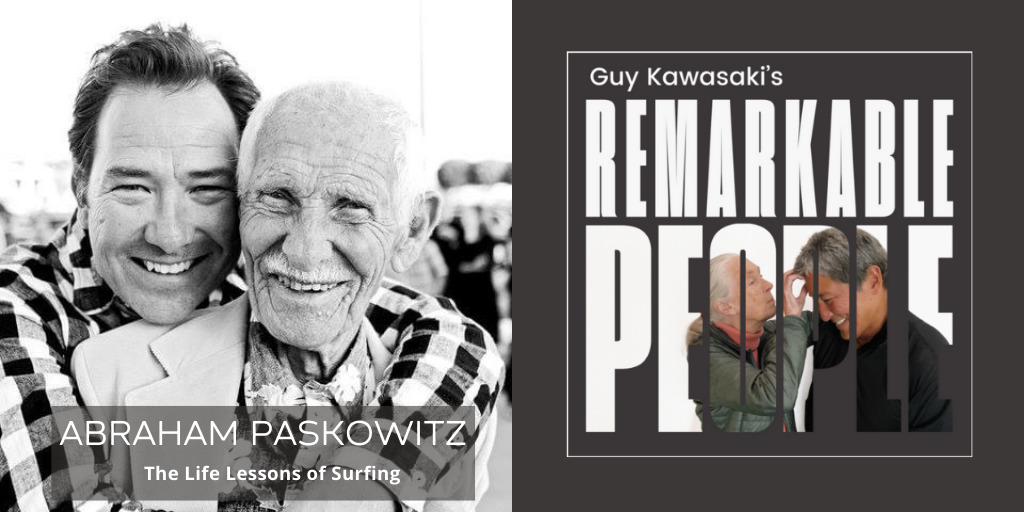
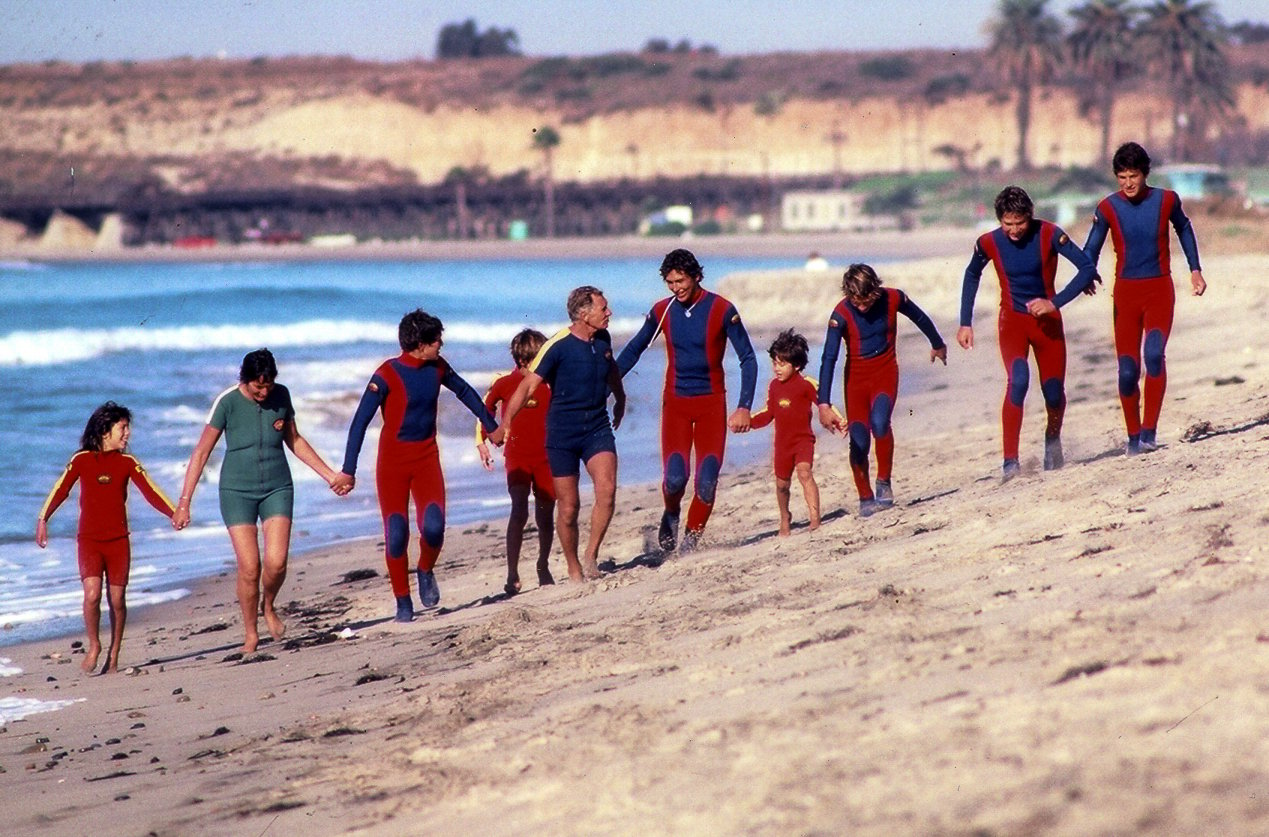
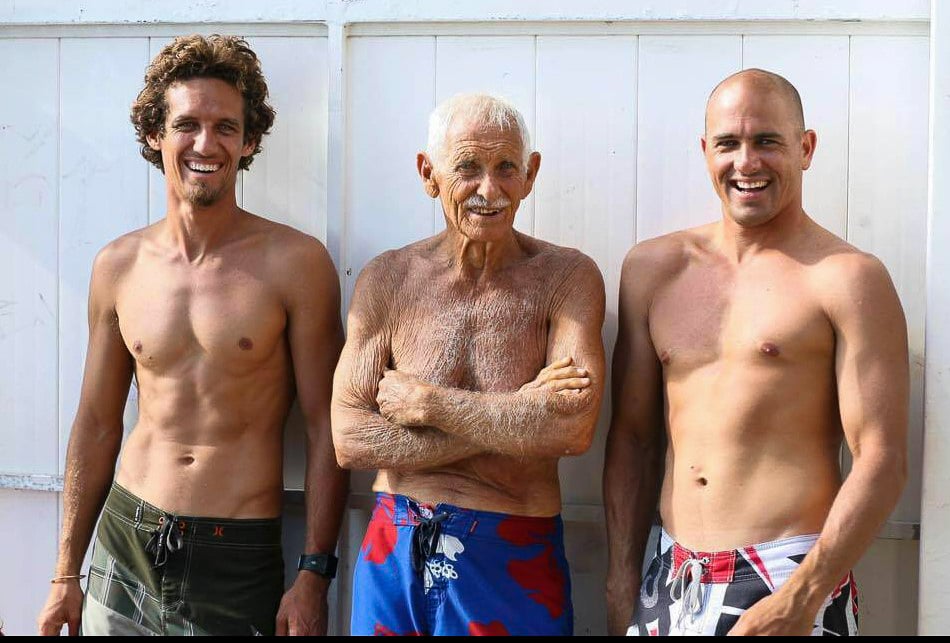
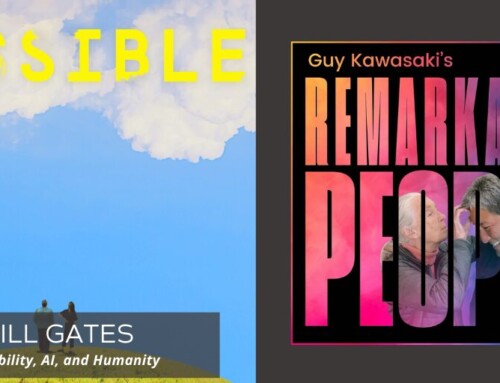
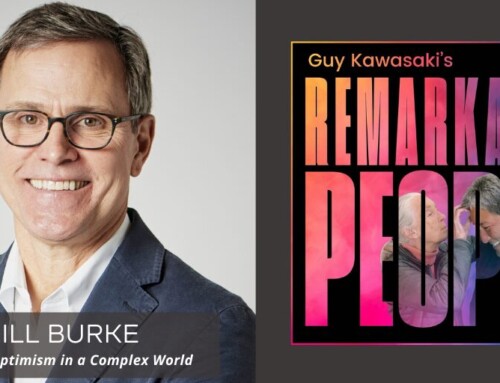
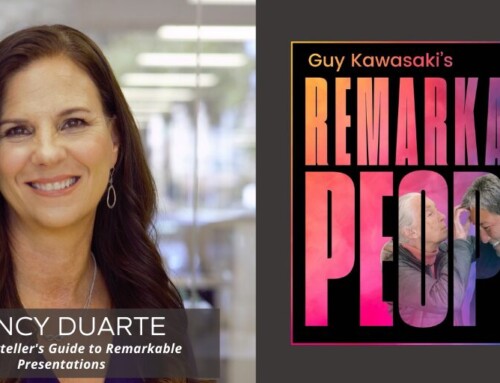
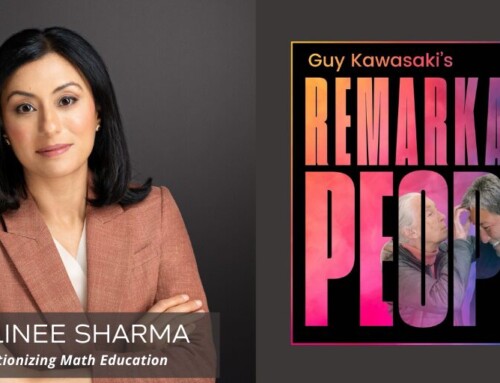
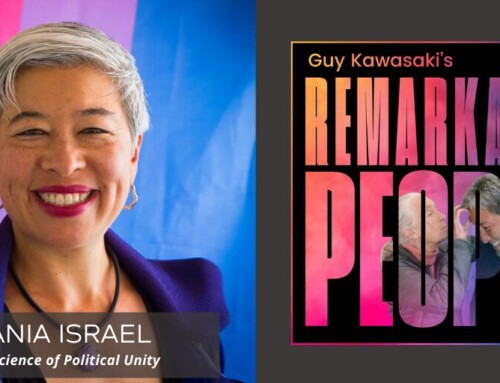
Leave a Reply